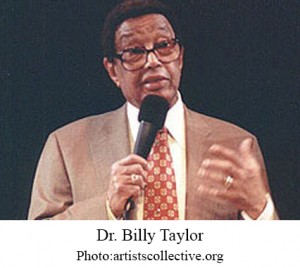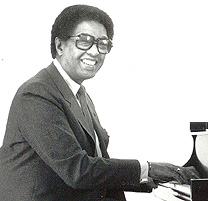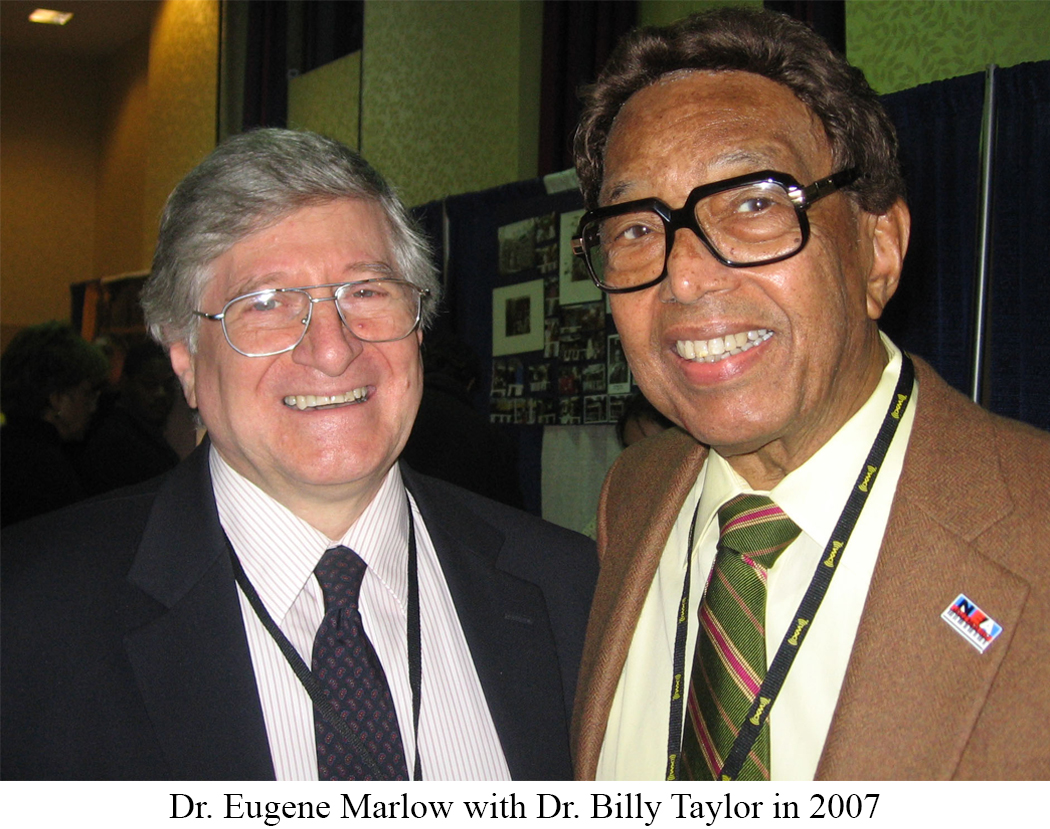My friend and mentor Dr. Billy Taylor passed on December 28, 2010 of heart failure at age 89. July 24, 2013 would have been his 92nd birthday. Dr. Taylor played a prominent role in my evolution as a composer and educator. Below is Part I of a commentary on our almost 30-year relationship.
Jazz Father Dr. Billy Taylor
Dr. Billy Taylor’s influence on my professional life cannot be under-estimated. Billy was my “jazz father”: mentor, a friend, and, most definitely, a role model. In many ways paralleling Leonard Bernstein’s eclectic “my work is in music” statement, Billy, seemingly without much effort (although I know differently) evolved as a jazz musician, a composer, arranger, band leader, radio producer, record producer, concert producer, author, journalist, and, perhaps most importantly, an educator.
He was a world-class statesman for jazz. Billy’s contribution to the elevation of jazz as America’s classical music is enormous. It was he who coined that phrase. His personal presentation and performance demeanor gave jazz a much needed classier and distinguished image. He was always well-dressed. He was an articulate, yet a gentleman who in a quiet but determined way advanced jazz as an important contribution to world culture. His importance in this context must be recognized. For a long while jazz musicians were perceived as loose living, drug addicted, hard-drinking people. To a degree this perception was deserved. Billy, on the other hand, was a class act who demonstrated that jazz was a music and ethos to be respected.
The ASCAP Jazz Songwriting Workshop
In 1980, in response to the urging of a vocalist friend at the time, I applied to an ASCAP-sponsored jazz songwriting workshop to be led by Dr. Billy Taylor. I was already familiar with his playing, so the prospect of being chosen for this workshop was compelling. At the time, though, presuming mostly much younger composers would be selected, I was quite modest about my chances. I was in my mid-thirties at the time and had composed perhaps a few dozen jazz pieces. Much to my surprise I was chosen to be among 32 participants for the six-week workshop. I later learned Billy had personally auditioned all the applicants’ audiotapes. I was excited, honored, and petrified.
The weekly evening seminar was held at ASCAP’s offices in the Lincoln Center area of Manhattan. When I arrived and began to scan the room to see who else was there I was in for a big surprise. This was an eclectic, almost ecumenical group of participants. The age range went from late teens to over 60. There were just as many men as women. The ethnicity was also broad. I felt privileged to be in the room.
 When Billy entered the conference room the high level of respect was palpable. When he sat down to play on the fairly in tune upright piano I felt the same kind of swoon that I did when I listened to Bill Evans or Oscar Peterson, especially in live performance. Incidentally, for a while in the early 1970s I lived next door to jazz pianist legend Bill Evans in Riverdale, New York (the same area where Billy lived). When I discovered my neighbor was the Bill Evans, I was so intimidated I literally stopped playing for about five years. The ASCAP jazz songwriting workshop was therefore pivotal in my coming back to the music I have loved since I was eight or nine years old.
When Billy entered the conference room the high level of respect was palpable. When he sat down to play on the fairly in tune upright piano I felt the same kind of swoon that I did when I listened to Bill Evans or Oscar Peterson, especially in live performance. Incidentally, for a while in the early 1970s I lived next door to jazz pianist legend Bill Evans in Riverdale, New York (the same area where Billy lived). When I discovered my neighbor was the Bill Evans, I was so intimidated I literally stopped playing for about five years. The ASCAP jazz songwriting workshop was therefore pivotal in my coming back to the music I have loved since I was eight or nine years old.
Not only did I admire Billy for his playing and composing, and all the other things he did in his very full life, I learned some important qualities about teaching. I’m a professor in the Department of Journalism and The Writing Professions at Baruch College in New York City. I’m also the senior co-chair of the Milt Hinton Jazz Perspectives Concert Series there. Several of the teaching characteristics I have infused in my own pedagogy I learned from observing Billy in this workshop.
What impressed me most about Billy’s interaction with the workshop participants was how he was able to relate to each person on their own level. Certainly, there were ranges of talent and experience in the room, but it didn’t matter to Billy. He was always patient and sought to bring out the best of each person in the room. His attitude–one that he expressed to me later–was that each person has potential and that potential should be nurtured. It was an astonishing teaching experience I have never forgotten.
The experience of that 1980 workshop resonates with me to this day. In addition to Billy’s extraordinary presence and commentary, he also brought in guest speakers, among them Harold Danko, who at the time was a rising star in his own right as a composer, pianist, and author. Harold became my first formal jazz composition teacher with whom I studied for almost two years. I sought him out at the workshop because of my own struggle to get beyond myself. Even though I had composed several dozen short pieces, I didn’t have a clue as to how to write them down. My goal was to learn how to write it out so that others could effectively and efficiently play my music. Harold became head of the jazz program at the Eastman School of Music in Rochester, New York. I’m still in touch with him.
Another guest speaker was jazz singer and educator Janet Lawson. I attended a few of her performances shortly after the workshop ended. Fast forward a couple of decades. About two years ago I ran into her at the New School where she teaches jazz singing. Janet and I have since collaborated on creating a couple of tracks for a vocal album I’m producing titled “In Their Own Voice.” Her lyrics have great depth.
The JazzMasters Series
 After the ASCAP workshop ended I made it a point of listening to Billy play live as often as possible, especially when he performed at Knickerbocker’s in downtown Manhattan. As always, he was generous with his time and person. He would sit with me and chat. I don’t remember what we talked about, but I was always impressed by his accessibility, warmth, and constant encouragement. So much so that I asked him to serve as co-producer of a television series on the history of jazz, based partly on his book Jazz Piano, with him as on-camera narrator. The series’ working title was JazzMasters. He readily agreed. He even sat for an hour while we shot video of him talking about the series. I should mention here that for almost a quarter century my professional life revolved around the television production business. Combining my television experience with my love of jazz seemed a natural for me.
After the ASCAP workshop ended I made it a point of listening to Billy play live as often as possible, especially when he performed at Knickerbocker’s in downtown Manhattan. As always, he was generous with his time and person. He would sit with me and chat. I don’t remember what we talked about, but I was always impressed by his accessibility, warmth, and constant encouragement. So much so that I asked him to serve as co-producer of a television series on the history of jazz, based partly on his book Jazz Piano, with him as on-camera narrator. The series’ working title was JazzMasters. He readily agreed. He even sat for an hour while we shot video of him talking about the series. I should mention here that for almost a quarter century my professional life revolved around the television production business. Combining my television experience with my love of jazz seemed a natural for me.
My budding relationship with Billy also seemed like a natural next step in terms of his involvement. Billy’s name, of course, opened many doors in terms of people wanting to participate. And shaping the series was also a no-brainer. The major stumbling block was raising the money. It’s always the money. I spent almost two years of my life working on the project to no avail. And as everyone knows, Ken Burns got to the money. I heard almost 15 million dollars worth.
In my opinion, Billy got short-shrift in the Burn’s series. Billy spent almost 70 years, a significant portion of the 20th century, working in jazz in various capacities. He should have been given much more on-camera time. Billy’s 20-year stint at CBS Sunday Morning as a musical arts correspondent (they did a nice retrospective piece on him in their January 2, 2011 broadcast) notwithstanding, I have often wondered why the PBS American Masters series never did a program on him. A senior member of the now defunct International Association for Jazz Education once did a documentary on him. I watched some of it. It was awful. It did not do Billy justice. He deserved better. He still does.
The failure of the JazzMasters project (and several other music-oriented television projects, including one for children with Peter Schickele) taught me some huge lessons about raising funds. But, more importantly, it also pushed me in a healthier direction. Despite other non-musical activities in my professional life, I had yet to fully embrace the musical impulses constantly traversing my body and soul.
Part II of my homage to Dr. Taylor next week.
Please write to me at meiienterprises@aol.com if you have any comments on this or any other of my blogs.
Eugene Marlow, Ph.D.
July 22, 2013
© Eugene Marlow 2013


